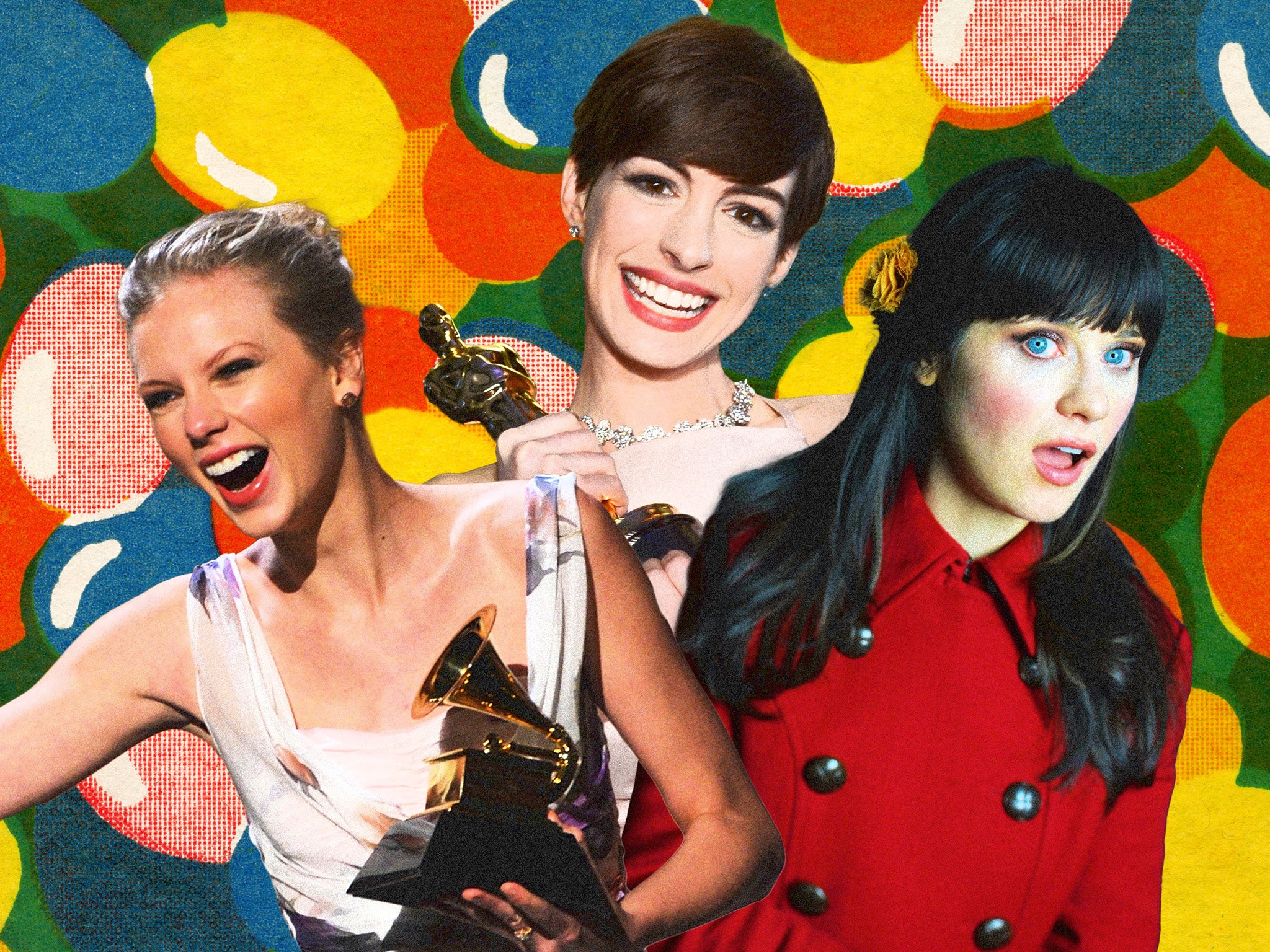Anne Hathahate was rooted in misogyny – and a new generation aren’t standing for it
The earnest female star – once criticised as being too theatrical, too quirky or, put simply, too much – is now being celebrated and reappraised by a younger and far less cynical generation. Meg Walters explores how we got here

Your support helps us to tell the story
From reproductive rights to climate change to Big Tech, The Independent is on the ground when the story is developing. Whether it's investigating the financials of Elon Musk's pro-Trump PAC or producing our latest documentary, 'The A Word', which shines a light on the American women fighting for reproductive rights, we know how important it is to parse out the facts from the messaging.
At such a critical moment in US history, we need reporters on the ground. Your donation allows us to keep sending journalists to speak to both sides of the story.
The Independent is trusted by Americans across the entire political spectrum. And unlike many other quality news outlets, we choose not to lock Americans out of our reporting and analysis with paywalls. We believe quality journalism should be available to everyone, paid for by those who can afford it.
Your support makes all the difference.In case you hadn’t heard, Anne Hathaway is cool again. So is Zooey Deschanel. And Taylor Swift. In the gladiator ring of pop culture, predicting who’ll get the metaphorical thumbs up or the thumbs down is an increasingly bewildering task. Step back and watch the process for long enough, and the seemingly random fluctuations of who is in and who is out may leave you with whiplash. In the latest reshuffling, it appears we have decided to bestow our favour on a few familiar faces. Specifically, faces that were once deemed to be too sweet, too eager, too open. Most significantly: too earnest.
Our sudden acceptance of the earnest celebrity isn’t merely a fluke – it’s a symptom of a much larger cultural shift. As a new generation comes of age, new values, priorities and perspectives are also taking hold. A millennial preference for irony, edge and sarcasm has been phased out. Earnestness is in, as are the stars that have most famously embodied it.
Zooey Deschanel was the indie queen of the 2000s, an archetype of wide-eyed quirk with a bundle of Smiths albums under her arm. The image crystalised in 2009, with her role as the titular love interest in the romcom 500 Days of Summer, and then two years later via her sitcom New Girl. With polka dots, vintage clothes and Peter Pan collar in tow, she became the poster child for the twee and “manic pixie” movements that dominated the era. A few years earlier, a young Anne Hathaway was anointed into Hollywood royalty via Disney’s The Princess Diaries (2001). By 2006, her turn in The Devil Wears Prada had made her a household name and burgeoning cultural icon. In every interview, she exuded a grinning, I’m-just-happy-to-be-here energy. Taylor Swift also strummed her way onto the scene in the 2000s as a golden-haired, angel-voiced embodiment of goodness. She was the ever-polite, ever-humble country star. She wore her heart on her sleeve. She was unwaveringly likeable.
As the 2010s wore on, however, people became disenchanted with this brand of unironic earnestness. “I’ve been trying for years to figure out why I don’t like Zooey Deschanel,” one 2011 thinkpiece in The New Republic began. “I’ve always known I’m not alone: A quick Google search will reveal plenty of female writers who take issue with the indie actress.” Deschanel was falling out of favour. “She is troublingly girlish, even childish,” the writer mused, adding that she’s “programmed to talk and behave exclusively as an adorable oddball”.
As for Hathaway, her infamously sincere Oscar acceptance speech in 2012 – “it came true!” she beamed – gave rise to a movement of so-called “Hathahaters”. Apparently, her earnestness off and on screen was annoying; it was rubbing us all the wrong way. “She’s got this theatre-kid thing where she adopts the mood of every situation she’s in […] but wildly overcompensates every time,” one critic whined to Hollywood.com. “She always seems like she’s performing, and her favourite act is this overstated humility and graciousness.” By 2016, Swift’s downfall had also commenced. #TaylorSwiftisOverParty trended number one on Twitter that year. “Taylor Swift isn’t like the other celebrities,” proclaimed Vice. “She’s worse.” Evidently, what had first been embraced as quirky and cute had become grating and cringeworthy over time. We rolled our eyes and roundly dismissed the earnest celebrity from our good graces.
But in the past few years, the mood has shifted yet again. Ambivalent coolness has lost its lustre. Now, images of Hathaway are plastered all over Twitter as a new troop of devoted fans gush over her glowing, Mod-inspired Cannes fashion. “I love seeing Anne Hathaway succeeding... flourishing... looking great,” wrote one fan. “I won’t forget when the internet just decided to hate on her for no reason during the 2010s.”
Deschanel is back in favour, too, with “twee” fashion – the mid-Noughties aesthetic that hinged on the quirky, cutesy and quaint – making a comeback on TikTok and New Girl returning to popularity during the 2020 lockdown. “The show embodies chaotic good at its finest, which is why it’s the ideal antidote to such a chaotic evil year,” one writer noted at the time.
As for Swift, she has experimented with a number of personas. After her sunny, country-pop persona drew backlash, she experimented with the broody, badass Reputation (2017), followed by the shiny, pink-hued Lover (2019). By 2020, however, she had fully embraced a more authentic version of herself via the mystical Folklore and Evermore, albums which emphasised heartfelt songwriting over bombastic production. In a viral commencement speech the singer-songwriter made at New York University in May, she even made the case for proud earnestness. “Learn to live alongside cringe,” she declared. “I’m a big advocate for not hiding your enthusiasm for things.” She added that she sees a “false stigma around eagerness in our culture of unbothered ambivalence”, and that this “perpetuates the idea that it’s not cool to want it”. She was, it could be argued, referring to the anti-earnest movement of the 2010s that saw Hathaway derided for – gasp – actually wanting an Oscar, or Deschanel for openly enjoying her dorky ukulele.
It’s impossible to examine this movement, though, without touching on the gender bias going on with the Hathahaters or twee-scorners. After all, it’s hard to think of many male celebrities who were subject to similar levels of derision for simply being themselves. It’s clear today that it wasn’t just that we disliked earnest women – we didn’t believe in it. “The anti-Hathers were a stark reminder that public-facing women aren’t allowed to want things, or they’ll be sentenced to an eternity in internet hell,” Jill Gutowitz wrote for Vice in 2019. “The baseless hate was textbook misogyny.”

The recent return to favour of these celebrities doesn’t hinge on anything they’ve actually done. Rather, it marks a shift in our culture’s attitude towards earnestness itself – and particularly the earnestness of women. The young people driving this shift seem to be rejecting edginess, self-deprecation and judgement at every turn. Rates of smoking, drinking and partying are falling. Meanwhile, trends like “hot girl summer” and “main character energy” promote unironic and outspoken self-love. They’re a generation sick of being told to tone themselves down, and they’re looking for earnest celebrities to idolise in the process. And who better to choose from than those outcast by their generational predecessors?
The likes of Hathaway and Deschanel aren’t alone in this, either. Other cheery theatre-kid types are also having a moment, from Andrew Garfield to West Side Story’s Ariana DeBose. Attempts to mount similar backlashes are being swiftly curtailed, too. Take the slightly scathing Daily Beast piece in January about DeBose’s enthusiastic, musical-loving and unapologetically theatrical West Side Story co-star Rachel Zegler. It claimed – derisively – that she’s “becoming the new Anne Hathaway”. The dismissive response to the piece proved that an appetite for anti-earnest criticism just isn’t really there anymore. “We’re not doing this again,” seemed to be the overarching reaction.
For the younger generation, there are more pressing matters at hand than deciphering whether Zegler’s painfully sincere Instagram stories – full of messages to herself from “the Universe” – are worthy of condemnation. Or Drew Barrymore’s recent, wild calls to run outside into the rain. In the grand scheme of things, our current crop of earnest celebrities – with all of their exuberant, in-your-face theatre-kid energy – are ultimately harmless. It leaves a cultural mood lacking in irony, which may inspire older generations to roll their eyes. But after years of belittling and second-guessing women for nothing but their personalities, it’s a vibe shift that can only be a positive one.



Join our commenting forum
Join thought-provoking conversations, follow other Independent readers and see their replies
Comments